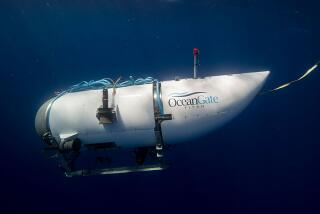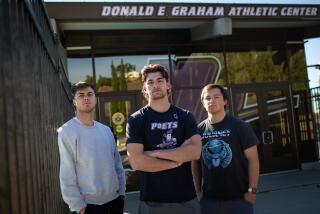College Sports Adventure Program Opens Door Into Outdoor Careers : Recreation: Two-year curriculum is designed to prepare students for middle-management positions in the sports industry, from skiing to whitewater rafting.
McHENRY, Md. — Four years after earning a degree in business from the University of Iowa, Tony DeCianni was bouncing from job to job in Chicago, working for a custom clothes shop, a cabinetmaker and car-rental and insurance agencies.
At lunch one day, he saw a tiny blurb in Backpacker Magazine describing an adventure sports program offered through Garrett Community College and Frostburg State University in Maryland.
“I always loved doing things outdoors,” DeCianni said, sitting on a rock during a lunch break of his rock climbing course. “I am so happy I made that choice.”
DeCianni is one of 23 students from seven states enrolled in the program, which is completing its first year.
One recent hot day, students in the rock-climbing class went to Carderock, a popular climbing spot with 50-foot cliffs.
The class was simulating a day teaching others safety and rock-climbing techniques. One acted as the instructor while the others took the roles of would-be students.
“We wear our helmets to protect the largest muscle in our bodies--our brain,” Lana Hill, an adventure sports enrollee from Bethel, Me., told her students. “You don’t want to leave with a different personality.
“Climbing is kind of like dancing. If it doesn’t look or feel like dancing, you probably need to rethink what you’re doing.”
While other students spend all their time hitting the books, students in the adventure sports program also hit the ski slopes, mountain bike trails and whitewater rivers.
The two-year adventure sports program is designed to prepare students for middle-management positions in the adventure sports industry, from skiing to whitewater rafting.
“If you’re going to make this a career, you’re not going to be taking people on rafts down a river and giving ski lessons,” said Michael Logsdon, program director. “If they break into a career in this, they’ll do business management.”
Students interested in the program have two options. They can attend Garrett Community College and earn an associate degree in adventure sports. Or they can earn the associate degree, transfer to nearby Frostburg State University for two more years and a bachelor’s degree in recreation with an emphasis on adventure sports.
The program is one facet of the Adventure Sports Institute, which works to advance public appreciation and participating in these sports. The institute, which organized the U.S. Canoe and Kayak Team Olympic Trials on the Savage River in May, 1992, also is interested in using adventure sports as an economic development tool in western Maryland.
The area is replete with whitewater rivers, lakes, forests, ski slopes and 150 miles of public trails, all within an eight-hour drive of 63% of the U.S. population.
Stacy Cardin, 18, of Appleton, Wis., graduated from high school in May, 1993, and didn’t know what she wanted to do.
“I wanted to do something in the outdoors, in the recreation field,” she said. “I didn’t want to be working in an office.”
Her parents weren’t too keen on the idea, but she convinced them she was determined to take the program and she arrived in western Maryland in January. She already has taken rafting classes and has reddish bruises on her tan legs to prove it.
Her friends were equally skeptical.
“Oh, you’re going to camping college,” she quoted them as saying. “What are you going to do after that?”
This is not the college equivalent of basket weaving. The program combines courses in business management, science, marketing and leadership development with adventure sports.
In addition to the sports, students take courses in communications, literature, mathematics, environmental science, natural history, computer science and economics.
“It’s the same economics course that an economics major would take,” said Logsdon, who teaches physics at Garrett Community College. “It’s the same English 101 you would take at the University of Maryland. Out of 66 credit hours, only 10 are credit courses in the skill areas.”
The adventure sports course includes mountain biking, scuba diving, fly fishing, backpacking, wilderness survival, winter camping, search-and-rescue and horsemanship.
In 1991, the adventure sports program founders invited 11 professionals from adventure sports-related businesses to a round-table discussion.
“We learned not to just teach people how to push a raft down the river, but how to help people understand the science of moving water,” Logsdon said.


